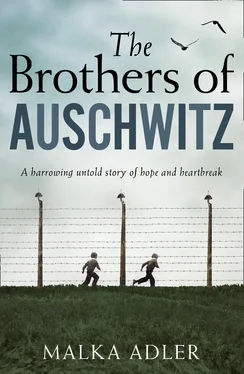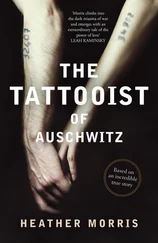1 ...6 7 8 10 11 12 ...19 If I told Yitzhak and Dov the truth, if I told them that between 15.5.44 and 8.7.44, they transported 501,507 Jews from Hungary, most of them to Auschwitz, Dov would say, I’m no good at math. They took us away before we learned such big numbers. And Yitzhak would say, what do you mean, immediately pouring vodka into a glass of grapefruit juice, and his wife, Hannah, would say, what do you need that for, and he’d say, for life, Hannah, and then I’d focus on Dov, and he wouldn’t believe a single word for five minutes. Then he’d clap his hands loudly, how did they manage that, wanting me to say: How did they manage it in two months, transport five hundred and one thousand and another five hundred and seven Jews out of Hungary, huh?
Less than two months, Yitzhak would correct. Less than two months, Dov.
Are you sure, Dov would ask me. Yes, yes, I’d say, I saw it on television, and then Dov would ask, what program, I know all the programs, and I’d say, Channel 8, maybe, or maybe Channel 23, and then Dov would say, boring, with a gesture as if brushing away a fly. Is there a crematorium on your channel? We can’t describe a crematorium standing there without smoke and smell. We can’t imagine the smell of flesh not coming out of the television.
The train stopped just as the nausea from the smell of flesh began. The end of the track. Impossible, Dov would say, possible, possible, Yitzhak would say, the Germans were good with large numbers, and then Dov would say, break. Bring juice for everyone, and I’d throw off my shoes, roll up my sleeves as high as possible, and look for a shutter to open, and Yitzhak would say, what’s the matter with you, and I’d say, hot flashes, it’s the age, pay no attention.
Yitzhak: How come I only studied up to third grade?
Dov: You didn’t want to study after third grade.
Only I studied all the time.
Yitzhak: Do you want to know the month of my birth in 1929?
When they took compost out to the field and planted cabbage.
The month of November.
11.11.1929. Dov was also born in November. One year before.
Dov: I was a year old when they sent me away from home.
We were born Czechoslovakians. Sent to die Hungarians.
In 1944, my family was taken to a concentration camp. Father Israel was forty-nine. Mother Leah was forty-two. The children were between fifteen and twenty.
We lived in the village of Tur’i Remety in the Carpathian Mountains, near the town of Perechyn. A small place, maybe six hundred families. Maybe thirty Jewish families. Our village was known for horse racing.
People from the area would come to us with their beautiful racehorses. I didn’t buy a ticket to the races. I had no money. I sat on a platform near the mountain. Ate an apple, played my harmonica with a phoo phoo phoo. Phoooo. Phoo. Phoo. Phoo. Phoooo. Phooah. That’s what came out and in the meantime I speculated on the horses’ chances. The races were in the time of the Czechs. The Hungarians put a stop to the races. War was already raging in Europe but they didn’t talk about it in the village, we were far away in the mountains.
The goyim – Jews – in our village were farmers. The Jews were merchants. Butchers, grocery, bakery, a flour mill, things like that. Jews always had money in their pockets.
In the village we’d gather in the evenings to peel corn with the goyim. Let’s say the corn in the Korol family’s corn field was ripe. The Korol family cuts the corn. The Korol family brings the corn to the storeroom. The village youngsters gather together in the evening to peel the corn.
The youngsters work, sing, eat hot corn. Sometimes two youngsters, a boy and a girl, yes, would peel the corn with a scrap of shirt, or trousers; and, unintentionally, yes, we’d soon start throwing peels at them, lots and lots of peels with hairs at the end, like a blanket, so they shouldn’t get cold, God forbid. By morning we were in vecherkas , as we called the gatherings with the goyim. The next day we’d go to another farmer and start the vecherkas and the fun all over again. Everything ended when soldiers came to the mountains and forced us to wear yellow patches.
Father Israel was a butcher.
We had a butcher shop next to our house. Father was also an animal trader and away from home three nights a week. We had a cow shed in the yard and we had geese and chickens. Mother raised the children. Mother milked the cows, helped in the store, ran the home, mother was an expert baker, her cakes tasted like the Garden of Eden. Mother worked and worked, didn’t rest for a moment. When we were hungry we took food for ourselves. We only sat down to eat a meal together on the Sabbath. When I was a year old my brother Yitzhak was born and I was sent away from home. My sister Sarah was five. My brother Avrum was three. Mother couldn’t take care of everyone at once. I was sent to Grandmother and Grandfather. They lived in another village, maybe thirty kilometers from my village. When I was three they brought me back home. My sister Sarah said I didn’t stop crying.
Our village was near a huge forest in the Carpathian Mountains.
What I loved most was walking in the forest. Always with a stick, because of the wolves. I loved swinging from branches and climbing trees. I would climb almost to the top of the tree and look out over fields, over houses. I only ever felt safe in trees. I knew no one would find me up there. I had my own private hiding place in the forest. I hung up a hammock made from a blanket I took from home and I ate fruit from a hoard I collected, all according to season. In the forest I knew where to find pears, mushrooms, berries and nuts. I was the first to know when the fruit was ready to eat.
In winter I suffered.
In winter I waited for the snow to melt so I could throw off my shoes and run barefoot to my forest. Mother embarrassed me. She’d run after me, shoes in hand. She’d call my name aloud in front of the neighbors, worried that I’d catch cold, shouting Avrum, Avrum, Avrum, to help her with me, but he’d go off with father. I’d hear, Sarah, Sarah, leave your book for a moment, nu, and go and look for your brother, put his shoes on and bring him home.
Sometimes I’d come back with Yitzhak, shoes in hand. Sometimes with Sarah. I liked feeling the cold earth. It was a nice tickling feeling in my back, right up to the hollow in my neck. Maybe that’s why my feet didn’t hurt when I walked in the camp with paper-thin soles.
Yitzhak and I went together to cheder – a traditional elementary school teaching Judaism and the Hebrew language. We started there at the age of four. We left home every day at five-thirty in the morning. In winter the temperature was twenty-five below zero. We’d hold hands and walk in the dark. We wore a coat, a hat, a scarf and gloves and woolen socks with shoes. Despite this my face hurt, like an iron stuck fast to my skin. I couldn’t feel my feet in that frost. Our legs were like planks bent in the middle. Our ear-locks were like barbed wire. We didn’t talk so our tongues wouldn’t fall out and stick to the snow.
We’d study for two hours in cheder and then go home. At the age of six, after cheder , we went to the Czech elementary school. We studied until 13:00 and went back to cheder in the afternoon. For at least another two or three hours.
A city rabbi would come to bless the village on two fixed occasions twice a year. The city rabbi was an important and respected man. He had a black coat, a hat, and a thick beard like steel wool. The rabbi would comb his beard with two fingers, stopping only to spit into a handkerchief. The rabbi didn’t say they’re throwing Jews into the Dnieper. The rabbi didn’t say they’re throwing Jews into the Dniester. The rabbi didn’t say they’re shooting Jews in forests. People in the village asked him as they had always done over the years, rabbi, what should we do. What should we do, rabbi, on the radio they speak against Jews, there are rumors, rabbi. They send families far away, where is far away, rabbi, what do they do to us there, does it hurt? And there have been whispers, rabbi, passing by word of mouth, whispers about mass graves of hundreds, thousands, danger is coming, rabbi, what is waiting for us, rabbi, tell us what is waiting for us, is this the end?
Читать дальше












